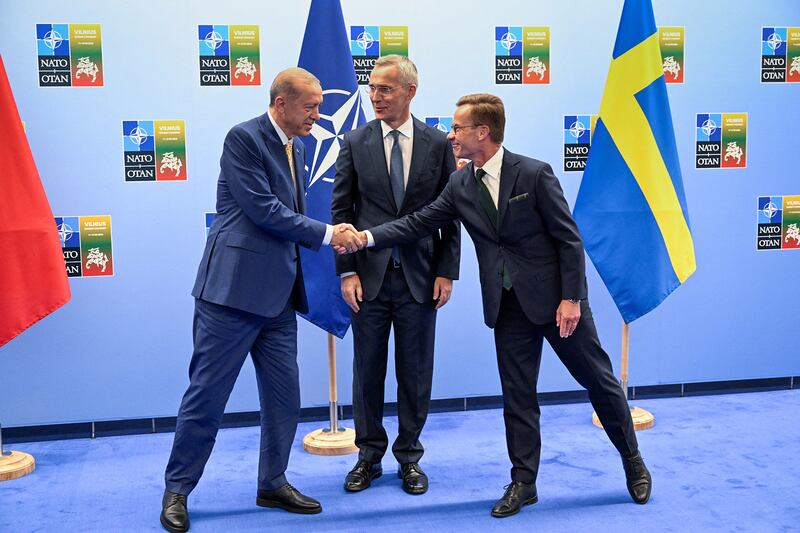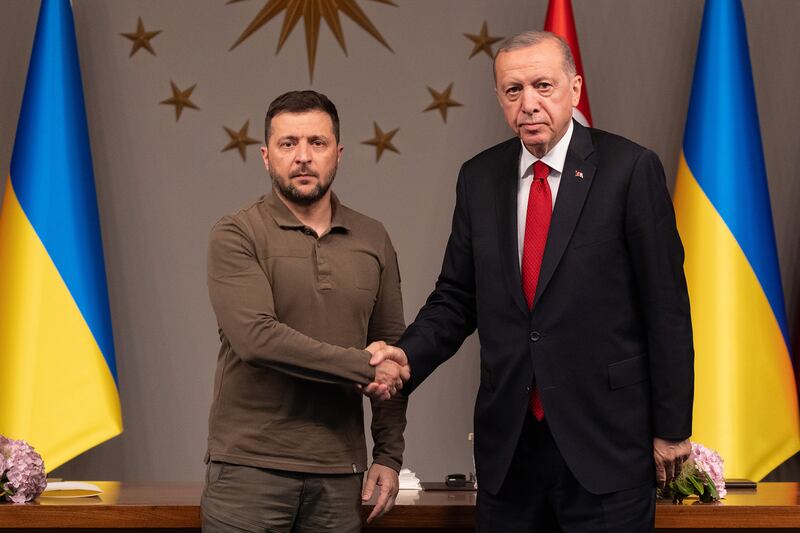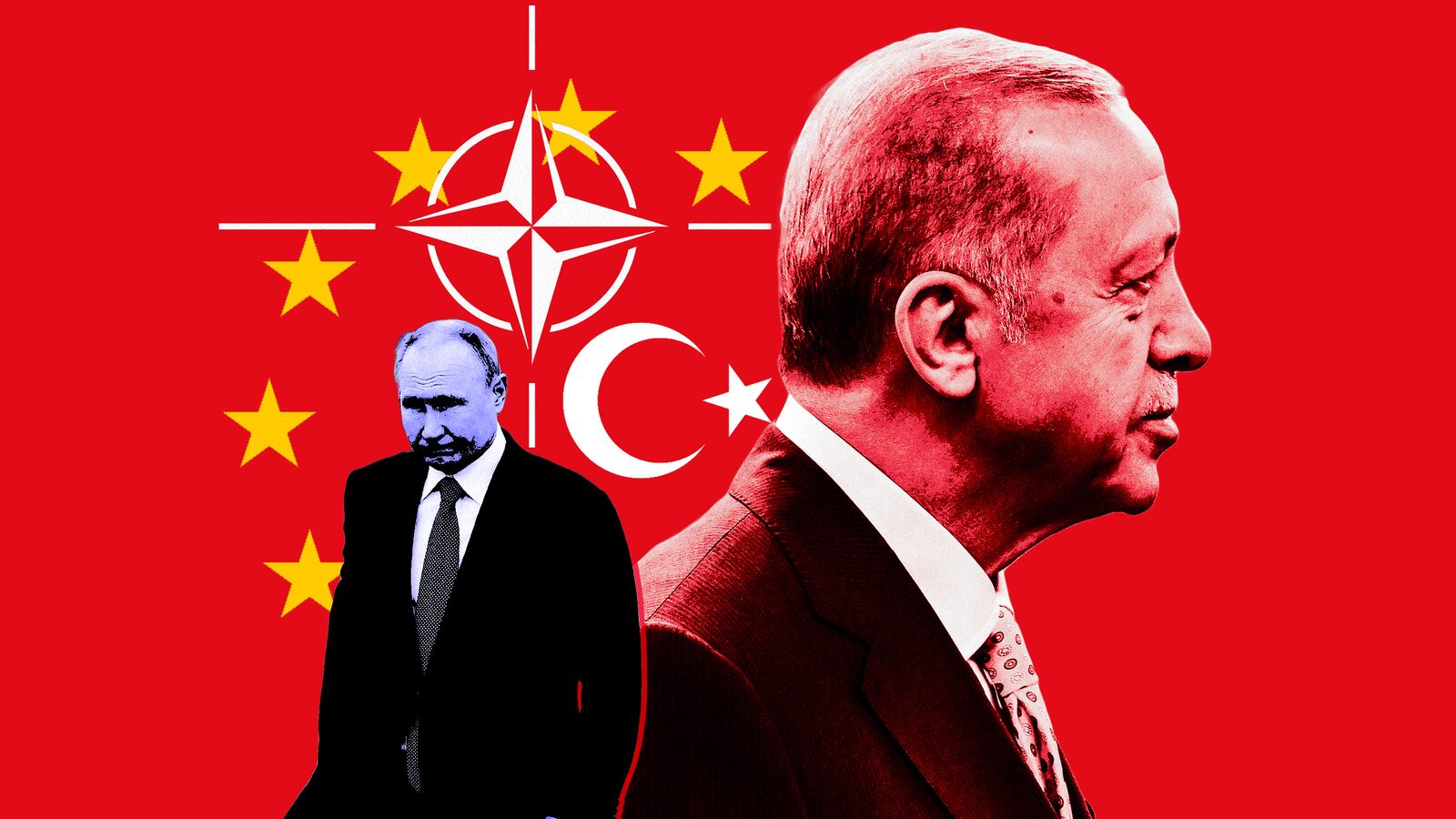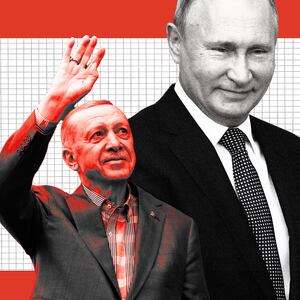After months of carefully navigating a relationship with Russian President Vladimir Putin during Russia’s war in Ukraine, Turkish President Recep Tayyip Erdogan seems to be calling it quits.
In just the last week, Erdogan has dropped his opposition to Sweden joining the North Atlantic Treaty Organization (NATO), a move that is sure to anger Putin, and announced his interest in reinvigorating Turkey’s efforts to join the European Union.
He also hosted Ukrainian President Volodymyr Zelensky in Istanbul and helped return Azovstal Ukrainian fighters captured by Russia to Ukraine, reneging on an agreement between Ankara and Moscow to hold the men until the war was over.
The series of snubs to Putin in the last week come just days after Yevgeniy Prigozhin and his Wagner mercenaries launched a failed mutiny against the Kremlin. The insurrection flopped, but left Putin’s grip on power shaken and likely forced Erdogan to question his alignment with Putin and lean into his partnerships with the West as one of the biggest members of NATO.
Even for all of the work Erdogan has done to navigate his relationships with both Putin and Western nations during the war in Ukraine, Erdogan is likely looking for a way to diversify his allegiances after the failed coup, said Selim Kuneralp, a former Turkish ambassador to Sweden.
“Erdogan probably doesn’t see that as a sign of strength for Putin—more like the opposite,” Kuneralp told The Daily Beast. “He thinks that after all, he’s got everything that he could get out of Putin. Putin is in a rather weaker position than he used to be so he’s perhaps not in a very good situation to provide material help to the Turkish economy and so on. So maybe he’s looking elsewhere.”
And while Turkish media touted last week’s diplomatic dance as a major win for Turkey, the calculations behind the scenes to support Sweden joining NATO likely aren’t so rosy.
The decision to pivot to the West may more likely be about optics and distancing from Putin than about securing concrete and immediate policy results.

Russia's President Vladimir Putin and Turkey's President Tayyip Erdogan meet during the 6th summit of the Conference on Interaction and Confidence-building Measures in Asia (CICA), in Astana, Kazakhstan Oct. 13, 2022.
Vyacheslav Prokofyev/Sputnik/ReutersWhile Erdogan tied Turkey’s efforts to join the EU to his support for Sweden’s NATO bid and secured some assurances from Sweden with respect to Turkey’s EU bid, promised Swedish support alone will not give Turkey’s EU process a significant boost.
Turkey’s EU plans have fallen flat in recent years. Following an attempted coup on his grip on power in 2016, Erdogan cracked down with constitutional reforms, raising red flags on Turkey’s human rights and legal track record and grinding the EU accession process to a halt. Germany and France have long eyed Turkey’s interest in joining the EU with consternation, and there are a whole host of critiques Turkey has faced through the years, from questions of judicial independence to Erdogan’s purge of coup plotters.
Sweden’s agreement to push for Turkey’s bid to join the EU isn’t going to bring Turkey to the finish line, according to Marc Pierini, a former EU ambassador to Turkey. Sweden’s support for the process doesn’t appear to go beyond the EU leaders’ June 30 agreement, which stated that examining “options identified by the European Council” for EU-Turkey relations should continue, and that EU-Turkey relations should proceed in a strategic manner.
The European Council’s president, Charles Michel, summarized the current state of play for Turkey’s bid to the EU earlier this week, noting he supports efforts to “re-energize our relations” and bring them to the “forefront.”
Erdogan’s decision to push Sweden on the EU process is likely more of a PR-stunt repeating old promises to rally domestic approval than it is a strategy to get major concessions from Sweden or roadblocks out of the way for joining the EU.
“The last-minute addition of an ‘EU concession’ was essentially an off-ramp to sell the decision to the Turkish audience,” Pierini told The Daily Beast. “Sweden is for nothing in this, it is simply a repetition of the June 30 conclusions.”
Nothingburger
Sweden’s statements that it will support Turkey’s bid means little to nothing, said Sinan Ulgen, a former Turkish diplomat who previously served at the Turkish Permanent Delegation to the European Union.
“It’s absolutely nothing. It’s totally window dressing,” Ulgen told The Daily Beast. “For those of us who know the dynamics and diplomacy around it, see this very clearly as an empty Swedish support to Turkey's new track... an empty promise.”
European officials aren’t sold on linking Turkey’s EU accession process to Sweden’s NATO process either.
“You cannot link the two processes,” European Commission spokesperson Dana Spinant said.
Similarly, Sweden has long been supportive of Turkey’s efforts to join the EU, so the statement is all but a platitude, according to Kuneralp, who also previously served as head of the Permanent Delegation of Turkey to the EU.

Turkish President Tayyip Erdogan and Swedish Prime Minister Ulf Kristersson shake hands next to NATO Secretary-General Jens Stoltenberg prior to their meeting, on the eve of a NATO summit, in Vilnius, Lithuania July 10, 2023.
Henrik Montgomery/TT News Agency via Reuters“Sweden has traditionally supported Turkey’s European Union interest… so there’s nothing very new in there,” Kuneralp told The Daily Beast. “And of course Sweden is only one of 27 countries in the European Union.”
Sweden’s statements may be besides the point, especially since Turkey does not appear prepared to carve out changes that would help it join the EU, Kuneralp added.
“There is no indication that President Erdogan plans to meet any of the conditions that European Union puts out,” Kuneralp said.
Other promises Erdogan secured from Sweden this week likewise may not bring sweeping changes.
One of Turkey’s major hang-ups in Sweden's bid to join NATO was that it claimed Sweden allowed members of the militant Kurdistan Workers’ Party (PKK) to operate freely. And although Erdogan received assurances that Stockholm would work on expanding “its counter-terrorism cooperation,” many of the negotiations with Sweden took place months ago.
Sweden previously amended its constitution and changed some of its counterterrorism laws in response to demands from Turkey that it help crack down on the PKK.
But even so, it’s possible that Sweden is not going to crack down in ways that are satisfying to Turkey. Many questions remain as to whether Sweden’s cooperation with Turkey on counterterrorism will meet all of the hopes and dreams of the Nationalist Action Party (MHP) in Turkey, which has been very focused on the terrorism issue, warned Ulgen.

President of Ukraine Volodymyr Zelensky and President of Turkey Recep Tayyip Erdogan during a joint press conference on July 8, 2023 in Istanbul, Turkey.
Chris McGrath/Getty ImagesSweden will “of course not” do everything Turkey wants on “counterterrorism,” Ulgen said. “Whatever Sweden does is going to be in conformity with the concept of Europe’s norms.”
Already, MHP leadership has lambasted Erdogan for looking past Sweden’s approach to counterterrorism, claiming their objections to Sweden joining NATO were legitimate.
“How will we come together with a country that embraces and tolerates terrorist organizations that directly threaten our national security,” said Devlet Bahceli, the leader of the MHP.
The Kremlin hit back on Turkey’s westward maneuvers this week, too. Dmitry Peskov, the Kremlin spokesperson, said Turkey shouldn’t get its hopes up for joining the EU.
“No one wants to see Turkey in Europe, I mean the Europeans. And here our Turkish partners should not wear rose-tinted spectacles,” Peskov said.
But even though it looks like Erdogan is walking away from Sweden with just talking points, he has won out in other ways.
Reading between the lines, it’s clear that Putin is going to continue trying to lean on Erdogan, who now has gained a little extra boost to his leverage over Putin in the last several days, said Ulgen.
“The asymmetry moved to Erdogan’s advantage, because now Putin needs Erdogan much more so than in the past in the sense that Turkey is the only NATO country that has this high-level political dialogue with Russia. Turkey is the only NATO country not to impose sanctions on Russia. Turkey’s the only NATO country that has kept its air corridor open to Russia,” Ulgen said. “Maintaining that access to the Western world—to Turkey—is vital for the Russian leadership, and this is what allows Erdogan to act in a way that he couldn’t before.”
What Erdogan really wants—F-16 jets from the United States—still appears to hang in the balance.
Jake Sullivan, President Joe Biden’s national security adviser, indicated on Tuesday that the Biden administration will be moving forward with the transfer of F-16s, albeit pending approval from Congress.
“President Biden has been clear and unequivocal for months that he’s supported the transfer of F-16s to Turkey,” Sullivan told reporters. “He has placed no caveats... He intends to move forward with that transfer.”








